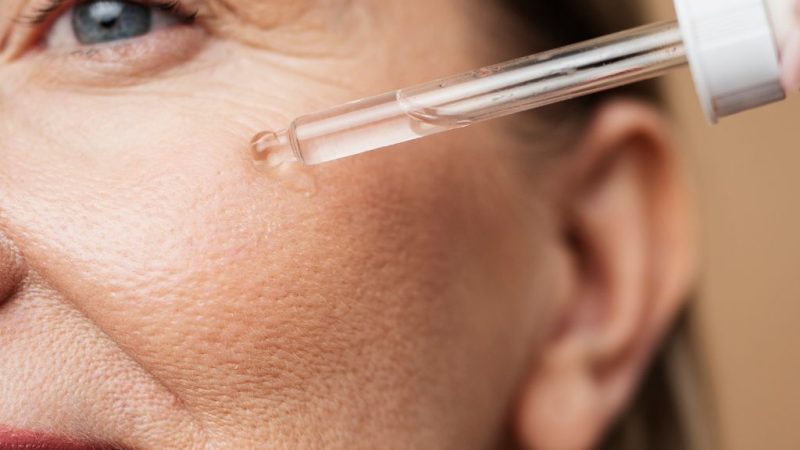Dark spots, also known as hyperpigmentation, are one of the most common skin concerns faced by people of all skin types. These spots can be caused by sun exposure, acne scars, hormonal changes, and aging. Fortunately, there’s a powerful skincare ingredient that dermatologists swear by — Vitamin C.
This antioxidant-rich compound is celebrated for its skin-brightening, tone-evening, and collagen-boosting effects. In this comprehensive guide, we’ll explore everything you need to know about using Vitamin C for dark spots, including its benefits, the right way to use it, and top-rated products to try.
What Causes Dark Spots?
Before diving into solutions, it’s important to understand what causes dark spots. Medically referred to as hyperpigmentation, these spots occur when excess melanin (the pigment responsible for skin color) forms deposits in the skin. Common causes include:
- Sun damage (solar lentigines or sun spots)
- Acne scarring
- Hormonal changes (melasma)
- Inflammation or injury to the skin
- Aging
Regardless of the cause, the result is the same: patches of uneven skin tone that many want to fade or eliminate.
What is Vitamin C and How Does It Work for Skin?
Vitamin C (ascorbic acid) is a water-soluble vitamin and a potent antioxidant. It plays an essential role in:
- Neutralizing free radicals caused by UV exposure and pollution
- Promoting collagen synthesis for firm, youthful skin
- Inhibiting melanin production to reduce the appearance of dark spots
When used topically, Vitamin C helps break down the pathways that cause excess pigment production in the skin, making it a highly effective agent for treating hyperpigmentation and dullness.
Key Benefits of Vitamin C for Dark Spots
Using Vitamin C regularly can result in significant skin improvements, especially when targeting pigmentation. Here are its most notable benefits:
a. Fades Hyperpigmentation
Vitamin C inhibits the enzyme tyrosinase, which helps reduce melanin production and gradually fades existing dark spots.
b. Brightens Dull Skin
It revitalizes dull complexions, making the skin look more radiant and refreshed by promoting cell turnover and inhibiting discoloration.
c. Protects Against Sun Damage
As an antioxidant, Vitamin C fights off free radicals that contribute to sun damage and premature aging, though it’s not a replacement for sunscreen.
d. Stimulates Collagen Production
Vitamin C enhances collagen production, helping reduce fine lines and post-inflammatory scars associated with acne.
e. Reduces Redness and Evens Skin Tone
With regular use, Vitamin C can help calm inflammation and even out skin tone, making it a favorite for sensitive or acne-prone skin types.
How to Use Vitamin C for Best Results
To get the most out of Vitamin C for dark spots, proper usage is key. Here’s how to incorporate it into your skincare routine:
Step-by-Step Application Guide
- Cleanse your face thoroughly to remove dirt and oil.
- Apply a Vitamin C serum on dry skin — usually in the morning.
- Follow up with moisturizer to lock in hydration.
- Always apply a broad-spectrum SPF 30+ sunscreen afterward.
Pro Tip: Pairing Vitamin C with Vitamin E and ferulic acid can enhance its effectiveness and stability.
Best Practices
- Use Vitamin C in the morning to combat daytime free radicals.
- Start with a lower concentration (10%) if you have sensitive skin.
- Store the product in a cool, dark place to prevent oxidation.
- Discontinue use if irritation, redness, or peeling occurs.
What to Look for in a Vitamin C Product
Choosing the right Vitamin C product can be confusing, as there are many variations. Here’s what to look for:
a. Type of Vitamin C
- L-Ascorbic Acid – Most effective but can be irritating for sensitive skin.
- Magnesium Ascorbyl Phosphate – Gentler, ideal for sensitive skin.
- Sodium Ascorbyl Phosphate – Stable and suitable for acne-prone skin.
b. Concentration
- 10–20% is the ideal range for effectiveness.
- Avoid higher concentrations if you’re new to Vitamin C or have reactive skin.
c. Packaging
- Opt for dark glass bottles or airless pumps to protect the formula from light and air, which can degrade Vitamin C quickly.
d. pH Level
- Effective formulations generally have a pH between 2.5 and 3.5, especially for L-Ascorbic Acid.
Best Vitamin C Products for Dark Spots
Based on dermatologist recommendations and user reviews, here are some of the best Vitamin C products specifically formulated to fade dark spots:
1. SkinCeuticals C E Ferulic
- 15% L-Ascorbic Acid, Vitamin E, and Ferulic Acid
- Clinically proven and highly effective
- Best for normal to dry skin
2. TruSkin Vitamin C Serum
- 20% Vitamin C, Hyaluronic Acid, and Vitamin E
- Affordable and well-rated on Amazon
- Best for all skin types
3. La Roche-Posay Pure Vitamin C Face Serum
- 10% pure Vitamin C, salicylic acid, and neurosensine
- Dermatologist-tested and suitable for sensitive skin
4. Paula’s Choice C15 Super Booster
- Lightweight with 15% Vitamin C, Vitamin E, and peptides
- Mixes well with other serums or moisturizers
5. Mad Hippie Vitamin C Serum
- Contains Sodium Ascorbyl Phosphate, Ferulic Acid, and Hyaluronic Acid
- Vegan, cruelty-free, and ideal for beginners
Vitamin C Side Effects and Precautions
While Vitamin C is generally safe, it can cause side effects in certain situations:
Potential Side Effects:
- Tingling or stinging upon application
- Redness or dryness
- Increased sensitivity if used with retinol or AHAs
Precautionary Tips:
- Always patch test new products on your inner arm or jawline.
- Don’t mix with benzoyl peroxide or retinol in the same routine.
- Avoid using oxidized (brownish) serum — it’s lost potency.
Conclusion
Vitamin C is more than just a skincare trend — it’s a proven ingredient that can visibly reduce dark spots, brighten skin tone, and protect against damage. Whether you’re dealing with acne scars, sun spots, or melasma, incorporating the right Vitamin C product into your daily routine can lead to brighter, smoother, and more even-toned skin.
By selecting a stable formulation, using it correctly, and combining it with SPF, you can harness the full power of this antioxidant and reclaim your natural glow.
FAQs
1. How long does it take for Vitamin C to fade dark spots?
You may begin to see results in 4 to 6 weeks with consistent use. Significant fading may take up to 3 months depending on the severity of pigmentation.
2. Can I use Vitamin C with other active ingredients?
Yes, but with caution. Avoid using it at the same time as retinol, benzoyl peroxide, or strong AHAs to prevent irritation. Alternate days or use at different times of day.
3. Is Vitamin C suitable for all skin types?
Yes, but those with sensitive or rosacea-prone skin should start with lower concentrations or derivative forms like magnesium ascorbyl phosphate.
4. Should I use Vitamin C in the morning or night?
Morning is ideal, as Vitamin C helps neutralize environmental damage. Always follow up with sunscreen for maximum protection.
5. Can I apply Vitamin C serum daily?
Absolutely. Most people can use Vitamin C once daily, typically in the morning. Sensitive users may start with every other day.
Also read: Inside COOLA Carlsbad: Sun Care Innovation from Southern California





